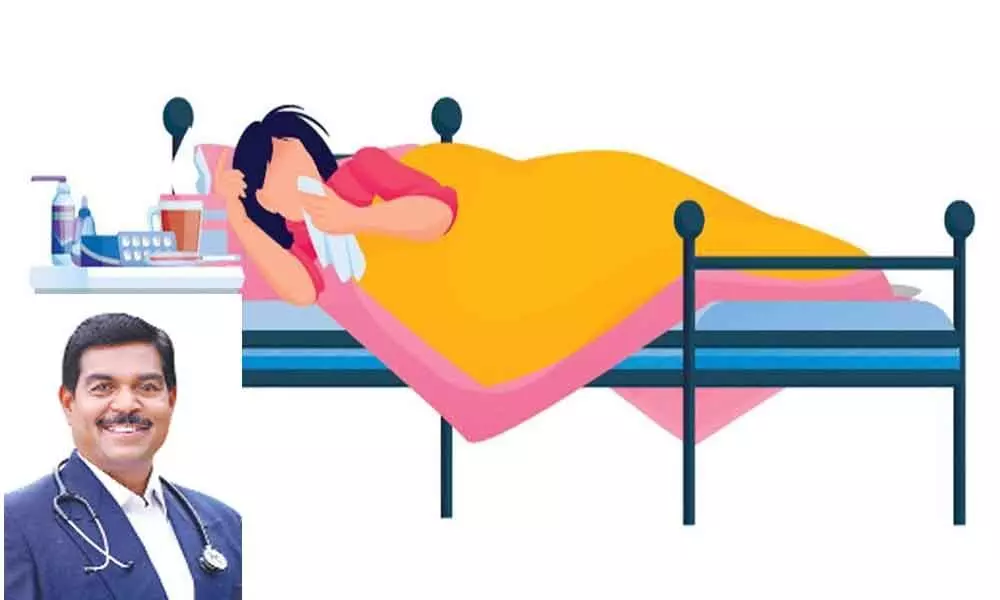Black fungus in Covid patients: Diabetics on steroids at higher risk says Dr Ramanna Macherla

Black fungus in Covid patients: Diabetics on steroids at higher risk says Dr Ramanna Macherla
In many cases, the disease progresses rapidly and may result in death unless underlying risk factors are corrected, and appropriate antifungal therapy and surgical procedures are initiated.
Coronavirus disease 2019 (Covid-19) continues to be a significant problem worldwide.
Mucormycosis, also called as black fungus, is a rare, emerging fungal infection, with high morbidity and mortality. It is alife-threatening fungal infection mostly occurring in haematology, solid organ transplant, or diabeticpatients, it may also affect immunocompetent patients (a person having normal immunity) following a trauma or burn.
The deadly combination of severe Covid-19 infection, diabetes mellitus and steroid usage is leading to an increased incidence of black fungus cases in recent times.
Otherwise, black fungus is a quintessential opportunistic infection and generally affects severely compromisedpersons
Sixdistinct clinical syndromes caused by invasive mucormycosis can occur insusceptible hosts, including rhino-orbital (face),cerebral (brain),pulmonary (lungs), gastrointestinal (intestines), cutaneous (skin).
How it causes disease?
We are seeing a massive upsurge of mucormycotic cases after Covid -19 infections.There are many reasons for this.However, one of the most important reason is undiagnosed and untreated hyperglycemia (excessive glucose) in Covid -19 patients that leading to glucotoxicity.Mucor organisms have enzyme called ketone reductase which helps to thrive in high glucose and acidic environment.
In many cases, the disease progresses rapidly and may result in death unless underlying risk factors are corrected, and appropriate antifungal therapy and surgical procedures are initiated.
Why more cases of mucor in second wave?
l May be steroid usage was less or not standardised during first wave.
l Climate change - first wave peaked in September 2020, second wave is peaking in summer May 2021.Maybe,the current temperature conditions are also favourable for the survival of this fungi.
Risk factors for Covid patients:
♦ Uncontrolled diabetes mellitus
♦ Patients who were treated with steroids
♦ Patients who were treated with immune modulators
♦ Those put on mechanical ventilation.
♦ Patients who were treated with long-standing oxygen therapy
When to suspect - ACovid 19 positive patient with following symptoms
♦ Sinus headache
♦ Blurred vision
♦ Bloody nasal discharge
♦ Stuffy nose
♦ Decreased vision
♦ Dental pain
Signs
♦ Facial swelling
♦ Facial discolouration
♦ Bulging of eyes
♦ Blackish discoloration of palate
♦ Drooping of eyelids
Diagnosis for black fungus:
♦ Deep nasal swab for PCR
♦ Diagnostic nasal endoscopy
♦ CT scan
♦ MRI scan
Treatment:
♦ Strict control of diabetes & diabetic ketoacidosis
♦ Reduce steroids (if patient is still on) with aim to discontinuerapidly
♦ Discontinue other immunomodulating drugs if patient is takinglike: Baricitinib, Tofacitinib
♦ Anti-fungal drug – Liposomal amphotericin B
♦ Surgical procedures if it's extensive
Prevention
1) Avoid unnecessary use of steroids in mild disease,
2) also avoid
♦ Steam inhalations abuse
♦ Use of higher antibiotics
♦ Poor oro-nasal hygiene in hospitalised patients
♦ use of same mask/unhygienic cloth masks for prolonged time
3) A simple act of checking random blood sugar before the first dose of steroid and pre-empting the action of steroid can go a long way in preventing severe hyperglycemia and hopefully mucormycosis
4) educating the patient or care giver about the symptoms and signs of rhino-orbital disease,
Misinformation
♦ Mucormycosis is not contagious. It does notspread from one person to another.
♦ It is not spread by oxygenation,humidifier and water. The fungi remain in theindoor & outdoor environment. It enters the respiratory tract via air.
♦ No antifungal prophylaxis (prevent treatment) is recommendedas the incidence is not more than 10 per cent in anyCovid-19 group.
(Dr RamannaMacherla, D.M(Gastro), is Associate Professor at Osmania Medical College, Hyderabad)

